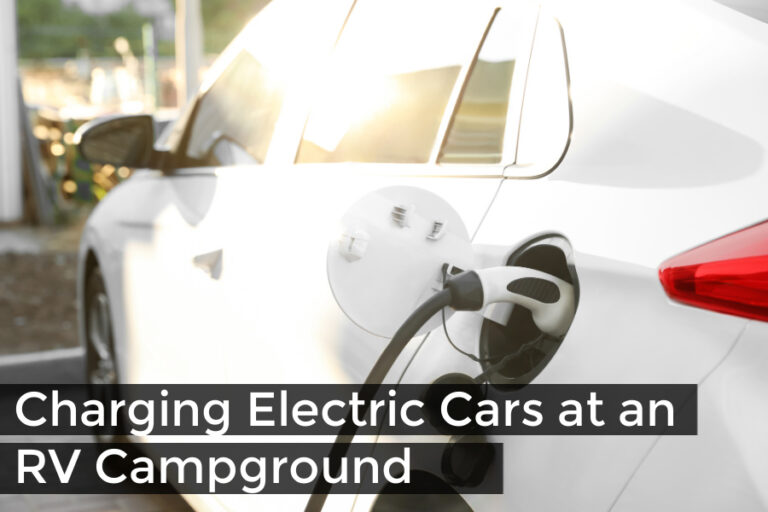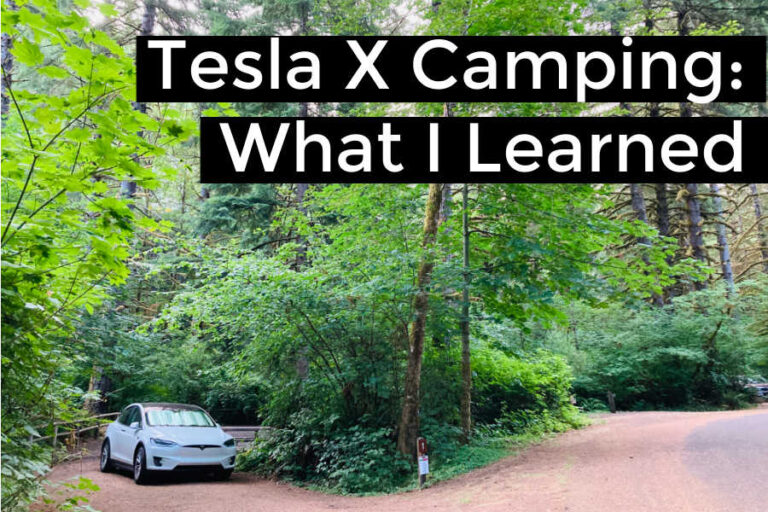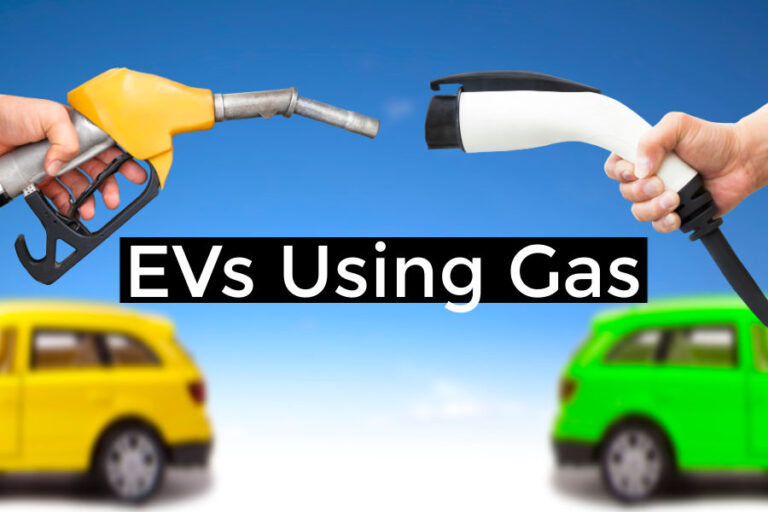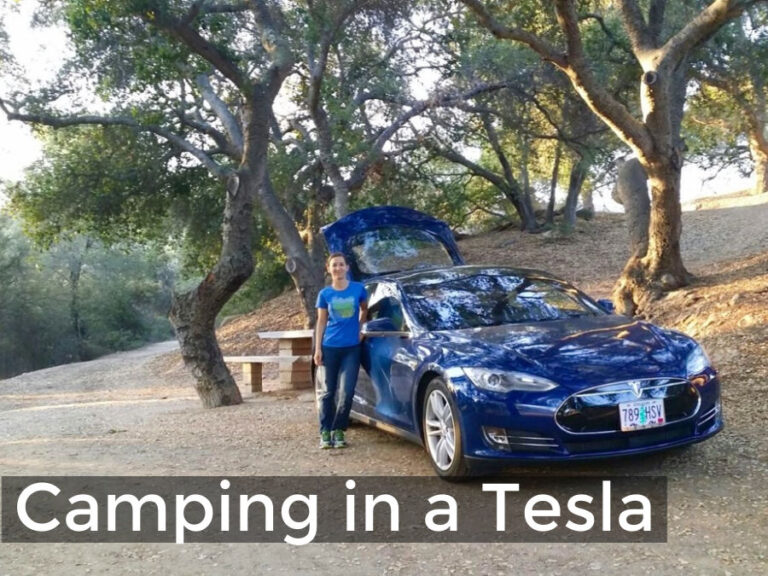EV vs. PHEV: Which Type of Vehicle is Best for Road Trips and Camping?
If you love road trips, camping, and traveling in general, then you might be seeking the perfect vehicle.
Currently we are on the cusp of the golden age of EVs and coming out of the golden age of hybrids. And now a new market segment has become extremely popular: PHEV, which stands for Plug In Hybrid Electric Vehicles.
Personally, this debate interests us because we use to own an EV and currently have a hybrid. We wish we could combine the benefits of both, and PHEVs do this. But should we look into an EV with better range? Let’s dive into this more.
- Why you should consider an EV or PHEV for road trips and travel
- Why EVs are better than PHEVs for road trips
- Why PHEVs are better than EVs for road trips
- What are the cons when considering using a PHEV or EV for travel
- The best EVs and PHEVs to purchase for travel
- What should I know before purchasing an EV or PHEV?
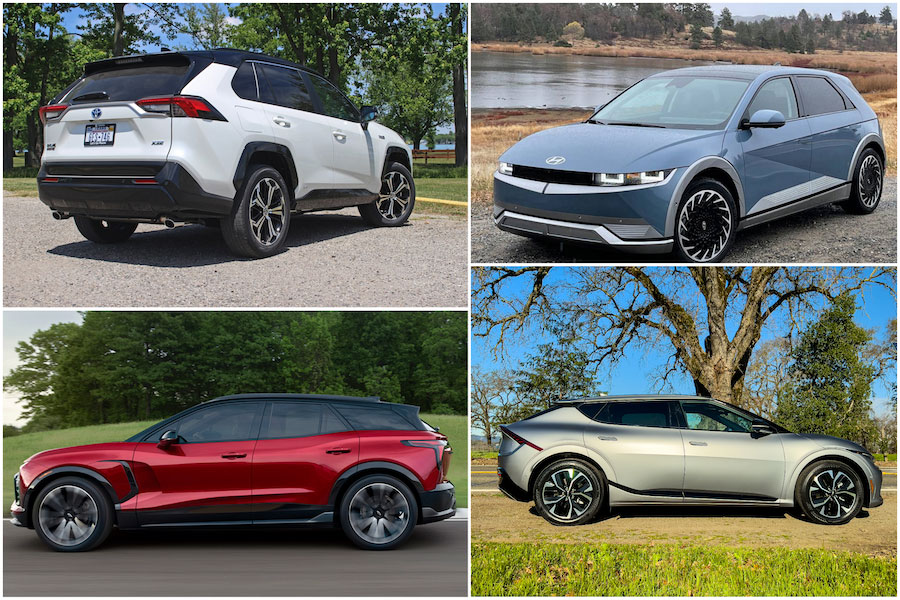 Why EVs and PHEVs are Great Vehicles for Road Trips and Camping
Why EVs and PHEVs are Great Vehicles for Road Trips and Camping
It’s important to note that both EVs and PHEVs offer several advantages over internal combustion engine (ICE) vehicles.
First, both EVs and PHEVs offer less dependence on gasoline. With the chaos and constant uncertainty in our world, gas prices have skyrocketed recently, making travel way more expensive than it used to be.
Both types of vehicles are extremely fun to drive (who doesn’t like that) because of the instant and exciting torque their drivetrains provide.
And if you use the vehicles in EV modes, there’s overall less wear and tear, and less maintenance needed, compared to ICE vehicles.
Additionally, both EVs and PHEVs are so technology driven that each them offer driver assist options that help for long road strips. For example, putting a Tesla into autopilot can help to alleviate long distance road trips.
Why EVs are better than PHEVs for travel
The number one difference between the two is that EVs have no dependency on gasoline.
With out-of-the-box range and the charging infrastructure improving each year, EVs increase their range and travel reach. Companies like Rivian are also starting to fill in gaps in the charging world by adding destination chargers to remote locations, giving their vehicles even more reach.
Because there is no ICE, the amount of maintenance needed for EVs is significantly less. The engine area is cleaner. Break pads don’t need to be replaced as often because of the regenerative braking technology. There are no fluids needed for the car, except for windshield wiper fluid.
The only really major maintenance need is rotation and replacement of tires on occasion.
Finally, there’s also a wider range of EVs available compared to PHEVs. From sedans, trucks, and in the near future, vans, the EV market offers a vehicle type to fit most travelers and their needs.
Why PHEVs are better than EVs for travel
The elephant in the room with any EV is range anxiety. And while PHEVs can operate on a limited all-EV capacity, they have a system that allows for great flexibility when on the road.
PHEVs have greater range because they can switch between full EV, Hybrid, or ICE at any given point.
With EVs and travel, you need to carefully plan your destinations around chargers. With a PHEV, you can plan and rest at ease, knowing you can easily cover a certain range. For example, our favorite PHEV, the Toyota RAV 4 Prime, has a total range of 600 miles!
You might be thinking, “Well, because it’s also an ICE, you probably pay a lot for gas”. False. Because of the EV/Hybrid system, PHEV vehicles are fuel efficient, especially for those that are SUVs.
Additionally, if you purchase a PHEV with excellent full-EV range, you may not need to use the gas in the tank for a long while. The Ford Escape Plug-in Hybrid has a EV range of 40 miles. That’s plenty of range for most urban drivers, and more than enough if you can charge at destination points.
Finally, the last advantage that PHEVs have over EVs is price. At the time of writing, a baseline Tesla Model Y (EV) costs around $70,000 — significantly more than a similar sized, Toyota RAV4 Prime (PHEV) at $40,000.
Why PHEVs and EVs may not be great for travel
If you are planning to tow anything, PHEVs and EVs may not be the best type of vehicle for you. Maybe at some point we’ll see a towing beast of an EV with 600 mile range (towing range of 300) but it probably won’t be for awhile.
If you have an RV trailer of any sort, the EV and PHEV will limit the size of your trailer or your vehicle’s range. It’s an important consideration for those who love this type of travel.
The best PHEVs and EVs for travel
Here’s a list of some of our favorite PHEVs and EVs currently on the market.
Note: whatever car you consider purchasing, you should also make a list of your needs and wants and find a vehicle that best meets your own priority list. Just because a vehicle doesn’t appear on our list, doesn’t mean it’s not a great car. It just means it didn’t fit what we’re looking for.
Here are the two most important things for us personally we took into consideration to come up with this list:
- Reasonably affordable: This is different for everyone. We’re specifically looking for vehicles around $10k – $50k. Rivian and Tesla Model Y are not in our budget.
- Range: We love going on long road trips. We used to have an EV that had about 100 miles of range and while we LOVED this EV, the range was extremely limiting. For EVs, we want a vehicle range between 275-350 miles. For a PHEV, we are looking for a full-EV range over 30 miles and a total range of at least 450 miles (equal or better than our Prius V).
Hyundai Ioniq 5 (EV)
Car and Driver’s top EV car of the year is the Hyundai Ioniq 5 and it deserves the attention. Just look at this beautiful EV.
This hatchback/SUV is about the size of a Tesla Model Y but priced considerably lower.
With a range of over 300 miles and incredible design all around, it’s no wonder that this has been a huge hit for Hyundai and for EV lovers. So much so that the biggest drawback is its availability — it’s almost impossible to find and purchase.
Hyundai Ionic 5 EV Highlights:
- Est. 303 miles of range (best option)
- Base price starts at $39,950
- Still qualifies for the $7,500 tax credit
>> Learn more at Hyundai’s website
KIA EV6
What happens if you can’t find a Hyundai Ioniq 5? You can find its step-sibling in the KIA EV6.
This EV is built on a similar platform, which means many things are similar. What’s the difference? Visually, they are different on the exterior and interior. There’s a little less space.
So it sounds like it’s not as good as the Ioniq 5, but it does have one big advantage: there’s more availability.
Kia EV6 EV Highlights:
- Est. 310 miles of range (best option)
- Base price starts at $41,400
- Still qualifies for the $7,500 tax credit
>> Learn more at Kia’s website
Chevy Blazer EV
Ok, so this upcoming SUV is not on the market yet, but it will be soon. What we like about it is that you get Tesla Model Y-like performance but at a much better base price.
Also, Chevy is making sure that its base model has important features. The higher range is reserved for the higher end models and reviewers complain about the head space in the back seats, but overall, this SUV looks like it will be a winner.
We actually owned a previous Chevy EV and really liked the experience overall. We feel they have a good handle on the overall EV experience.
Chevy Blazer EV SUVHighlights:
- Est. 320 miles of range (best option)
- Base price starts at $44,995
>> Learn more at Chevy’s website
Toyota RAV4 Prime (PHEV)
At the moment, this is our front runner for a new vehicle. With 42 miles of full EV range and 600 miles of total range, this PHEV blends the perfect combination of use, style, and performance.
Oh and the price is great as well, compared to comparable EV SUVs. It’s WAY more affordable compared to Teslas and Rivian.
So what’s the downside? Similar to the Hyundai IONIQ 5 and most of the amazing vehicles out there, supply and availability is low.
Toyota Rav4 Prime PHEV Highlights:
- Est. 42 miles of EV range
- Base price starts at $40,300
>> Learn more at Toyota’s website
Chrysler Pacific Hybrid Van (PHEV)
The Chrysler Pacifica PHEV is the best mini-van PHEV. It’s also the only one out there. In fact, it’s currently the only of it’s kind, EV or PHEV.
But even though they dominate this segment, the Chrysler Pacifica is a great van and does a lot of things well. First, there is a ton of space to move people, things, or use it for car camping.
Second, you can get 32 miles of full EV range and up to 520 total range. This makes its it an efficient vehicle to use for its class.
Chrysler Pacific Hybrid PHEV Highlights:
- Est. 32 miles of EV range
- Base price starts at $40,300
>> Learn more at Chrysler’s website
What should I know before buying an EV or PHEV?
As with purchasing any vehicle, it’s worth taking the time to do some research and personally reflect to find a balance of your needs and wants.
Remember, every purchaser is different and so you should filter other peoples’ opinions (including ours). Sometimes the best car for you is not always the car you want or dream of.
Here are some things to consider before purchasing an EV or PHEV:
- Size: How many passengers and how much storage do you need?
- Price: What’s your budget? Try to factor in savings from deals or incentives like tax credits, AND potential fuel savings. A vehicle might be expensive initially, but might be overall more affordable than another due to other expense saving factors (gas, maintenance, etc..)
- Range: How far do you need to travel? Can you make most trips using full EV mode? Is it more important to you do less stops and waiting when you travel?
- Safety features and reliability ratings: Some cars are just built to last. Some vehicles also have top ratings for safety. Is that important to you?
- Ride and comfort: If possible, go and test drive the car you’re interested in and even those you’re not. It’s good to get a sense of what’s out there.
- Additional features: Make a list of features that are important to you, like audio quality, Apple Carplay/Android Auto compatibility, seat warmers, seat position memory, auto driving, etc… Determine what are must haves and what you can live without.
Did we miss anything? What are some important factors that you consider when making a vehicle purchase? Let us know in the comments below.
